Hwanjun Song
Towards a Holistic and Automated Evaluation Framework for Multi-Level Comprehension of LLMs in Book-Length Contexts
Aug 27, 2025

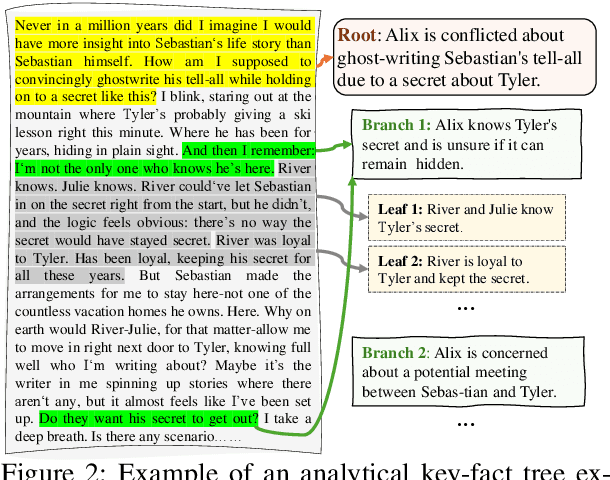

Abstract:We introduce HAMLET, a holistic and automated framework for evaluating the long-context comprehension of large language models (LLMs). HAMLET structures source texts into a three-level key-fact hierarchy at root-, branch-, and leaf-levels, and employs query-focused summarization to evaluate how well models recall and faithfully represent information at each level. To validate the reliability of our fully automated pipeline, we conduct a systematic human study, showing that our automatic evaluation achieves over 90% agreement with expert human judgments, while reducing the cost by up to 25 times. HAMLET reveals that LLMs struggle with fine-grained comprehension, especially at the leaf level, and are sensitive to positional effects like the lost-in-the-middle. Analytical queries pose greater challenges than narrative ones, and consistent performance gaps emerge between open-source and proprietary models, as well as across model scales. Our code and dataset are publicly available at https://github.com/DISL-Lab/HAMLET.
References Indeed Matter? Reference-Free Preference Optimization for Conversational Query Reformulation
May 10, 2025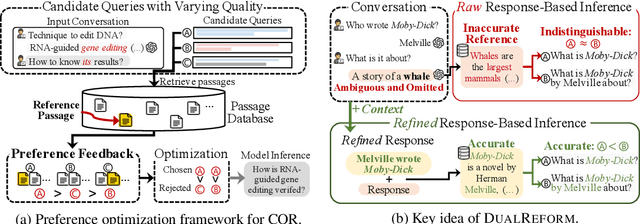
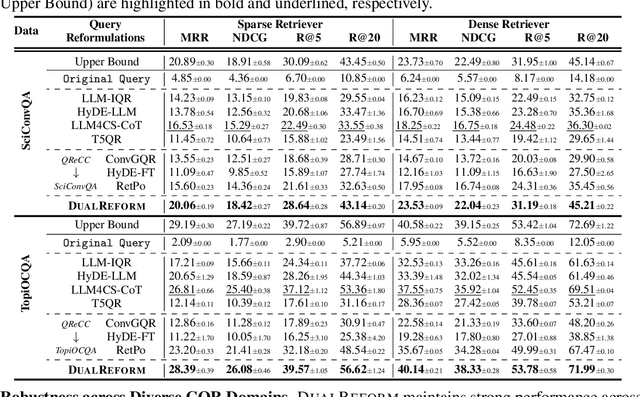
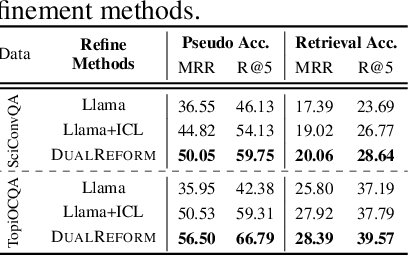
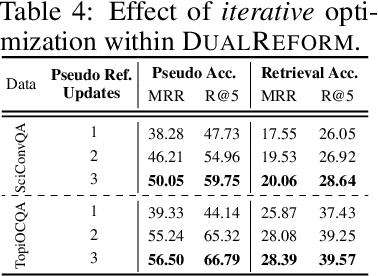
Abstract:Conversational query reformulation (CQR) has become indispensable for improving retrieval in dialogue-based applications. However, existing approaches typically rely on reference passages for optimization, which are impractical to acquire in real-world scenarios. To address this limitation, we introduce a novel reference-free preference optimization framework DualReform that generates pseudo reference passages from commonly-encountered conversational datasets containing only queries and responses. DualReform attains this goal through two key innovations: (1) response-based inference, where responses serve as proxies to infer pseudo reference passages, and (2) response refinement via the dual-role of CQR, where a CQR model refines responses based on the shared objectives between response refinement and CQR. Despite not relying on reference passages, DualReform achieves 96.9--99.1% of the retrieval accuracy attainable only with reference passages and surpasses the state-of-the-art method by up to 31.6%.
Rethinking LLM-Based Recommendations: A Query Generation-Based, Training-Free Approach
Apr 16, 2025Abstract:Existing large language model LLM-based recommendation methods face several challenges, including inefficiency in handling large candidate pools, sensitivity to item order within prompts ("lost in the middle" phenomenon) poor scalability, and unrealistic evaluation due to random negative sampling. To address these issues, we propose a Query-to-Recommendation approach that leverages LLMs to generate personalized queries for retrieving relevant items from the entire candidate pool, eliminating the need for candidate pre-selection. This method can be integrated into an ID-based recommendation system without additional training, enhances recommendation performance and diversity through LLMs' world knowledge, and performs well even for less popular item groups. Experiments on three datasets show up to 57 percent improvement, with an average gain of 31 percent, demonstrating strong zero-shot performance and further gains when ensembled with existing models.
ReFeed: Multi-dimensional Summarization Refinement with Reflective Reasoning on Feedback
Mar 27, 2025Abstract:Summarization refinement faces challenges when extending to multi-dimension. In this paper, we introduce ReFeed, a powerful summarization refinement pipeline that enhances multiple dimensions through reflective reasoning on feedback. To achieve this, we release SumFeed-CoT, a large-scale Long-CoT-based dataset optimized for training a lightweight model with reflective reasoning. Our experiments reveal how the number of dimensions, feedback exposure, and reasoning policy influence refinement performance, highlighting reflective reasoning and simultaneously addressing multiple feedback is crucial to mitigate trade-off between dimensions. Furthermore, ReFeed is robust to noisy feedback and feedback order. Lastly, our finding emphasizes that creating data with a proper goal and guideline constitutes a fundamental pillar of effective reasoning. The dataset and model will be released.
LLM-based User Profile Management for Recommender System
Feb 20, 2025



Abstract:The rapid advancement of Large Language Models (LLMs) has opened new opportunities in recommender systems by enabling zero-shot recommendation without conventional training. Despite their potential, most existing works rely solely on users' purchase histories, leaving significant room for improvement by incorporating user-generated textual data, such as reviews and product descriptions. Addressing this gap, we propose PURE, a novel LLM-based recommendation framework that builds and maintains evolving user profiles by systematically extracting and summarizing key information from user reviews. PURE consists of three core components: a Review Extractor for identifying user preferences and key product features, a Profile Updater for refining and updating user profiles, and a Recommender for generating personalized recommendations using the most current profile. To evaluate PURE, we introduce a continuous sequential recommendation task that reflects real-world scenarios by adding reviews over time and updating predictions incrementally. Our experimental results on Amazon datasets demonstrate that PURE outperforms existing LLM-based methods, effectively leveraging long-term user information while managing token limitations.
Faithful, Unfaithful or Ambiguous? Multi-Agent Debate with Initial Stance for Summary Evaluation
Feb 12, 2025Abstract:Faithfulness evaluators based on large language models (LLMs) are often fooled by the fluency of the text and struggle with identifying errors in the summaries. We propose an approach to summary faithfulness evaluation in which multiple LLM-based agents are assigned initial stances (regardless of what their belief might be) and forced to come up with a reason to justify the imposed belief, thus engaging in a multi-round debate to reach an agreement. The uniformly distributed initial assignments result in a greater diversity of stances leading to more meaningful debates and ultimately more errors identified. Furthermore, by analyzing the recent faithfulness evaluation datasets, we observe that naturally, it is not always the case for a summary to be either faithful to the source document or not. We therefore introduce a new dimension, ambiguity, and a detailed taxonomy to identify such special cases. Experiments demonstrate our approach can help identify ambiguities, and have even a stronger performance on non-ambiguous summaries.
Learning to Verify Summary Facts with Fine-Grained LLM Feedback
Dec 14, 2024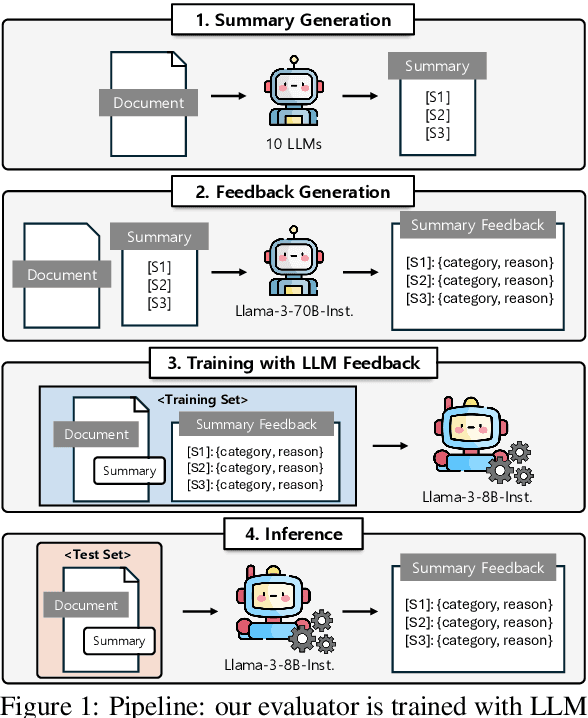


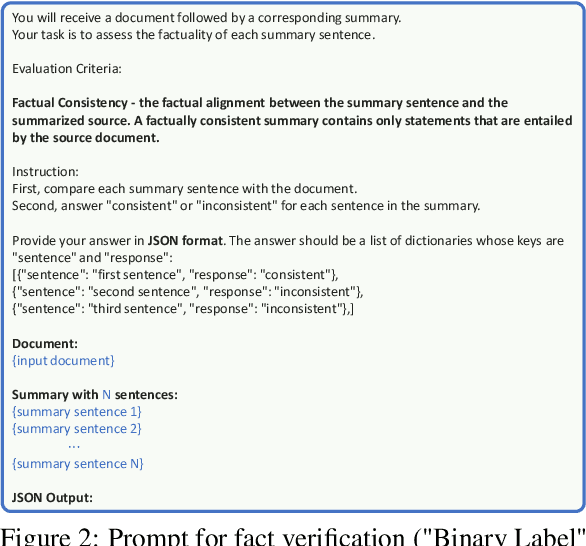
Abstract:Training automatic summary fact verifiers often faces the challenge of a lack of human-labeled data. In this paper, we explore alternative way of leveraging Large Language Model (LLM) generated feedback to address the inherent limitation of using human-labeled data. We introduce FineSumFact, a large-scale dataset containing fine-grained factual feedback on summaries. We employ 10 distinct LLMs for diverse summary generation and Llama-3-70B-Instruct for feedback. We utilize this dataset to fine-tune the lightweight open-source model Llama-3-8B-Instruct, optimizing resource efficiency while maintaining high performance. Our experimental results reveal that the model trained on extensive LLM-generated datasets surpasses that trained on smaller human-annotated datasets when evaluated using human-generated test sets. Fine-tuning fact verification models with LLM feedback can be more effective and cost-efficient than using human feedback. The dataset is available at https://github.com/DISL-Lab/FineSumFact.
In-Context Learning with Noisy Labels
Nov 29, 2024Abstract:In-context learning refers to the emerging ability of large language models (LLMs) to perform a target task without additional training, utilizing demonstrations of the task. Recent studies aim to enhance in-context learning performance by selecting more useful demonstrations. However, they overlook the presence of inevitable noisy labels in task demonstrations that arise during the labeling process in the real-world. In this paper, we propose a new task, in-context learning with noisy labels, which aims to solve real-world problems for in-context learning where labels in task demonstrations would be corrupted. Moreover, we propose a new method and baseline methods for the new task, inspired by studies in learning with noisy labels. Through experiments, we demonstrate that our proposed method can serve as a safeguard against performance degradation in in-context learning caused by noisy labels.
Learning to Summarize from LLM-generated Feedback
Oct 17, 2024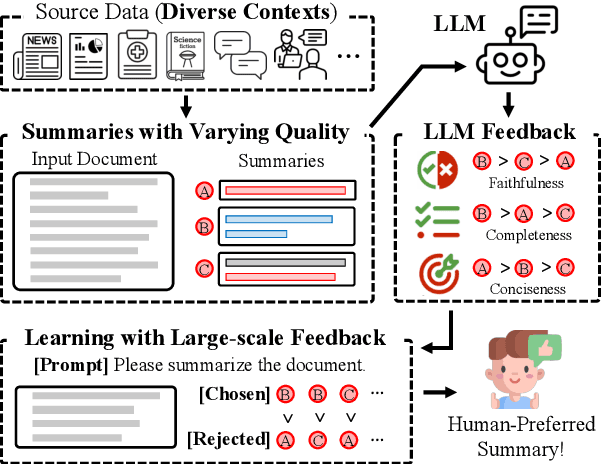



Abstract:Developing effective text summarizers remains a challenge due to issues like hallucinations, key information omissions, and verbosity in LLM-generated summaries. This work explores using LLM-generated feedback to improve summary quality by aligning the summaries with human preferences for faithfulness, completeness, and conciseness. We introduce FeedSum, a large-scale dataset containing multi-dimensional LLM feedback on summaries of varying quality across diverse domains. Our experiments show how feedback quality, dimensionality, and granularity influence preference learning, revealing that high-quality, multi-dimensional, fine-grained feedback significantly improves summary generation. We also compare two methods for using this feedback: supervised fine-tuning and direct preference optimization. Finally, we introduce SummLlama3-8b, a model that outperforms the nearly 10x larger Llama3-70b-instruct in generating human-preferred summaries, demonstrating that smaller models can achieve superior performance with appropriate training. The full dataset will be released soon. The SummLlama3-8B model is now available at https://huggingface.co/DISLab/SummLlama3-8B.
UniSumEval: Towards Unified, Fine-Grained, Multi-Dimensional Summarization Evaluation for LLMs
Sep 30, 2024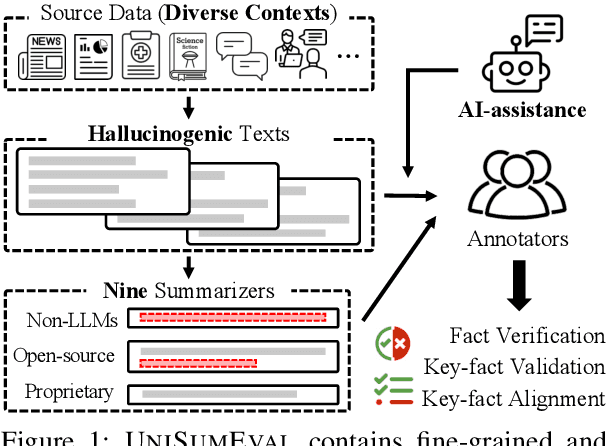

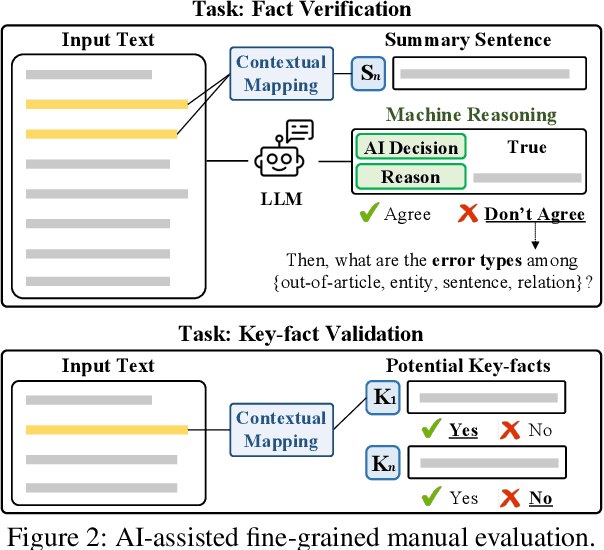

Abstract:Existing benchmarks for summarization quality evaluation often lack diverse input scenarios, focus on narrowly defined dimensions (e.g., faithfulness), and struggle with subjective and coarse-grained annotation schemes. To address these shortcomings, we create UniSumEval benchmark, which extends the range of input context (e.g., domain, length) and provides fine-grained, multi-dimensional annotations. We use AI assistance in data creation, identifying potentially hallucinogenic input texts, and also helping human annotators reduce the difficulty of fine-grained annotation tasks. With UniSumEval, we benchmark nine latest language models as summarizers, offering insights into their performance across varying input contexts and evaluation dimensions. Furthermore, we conduct a thorough comparison of SOTA automated summary evaluators. Our benchmark data will be available at https://github.com/DISL-Lab/UniSumEval-v1.0.
 Add to Chrome
Add to Chrome Add to Firefox
Add to Firefox Add to Edge
Add to Edge